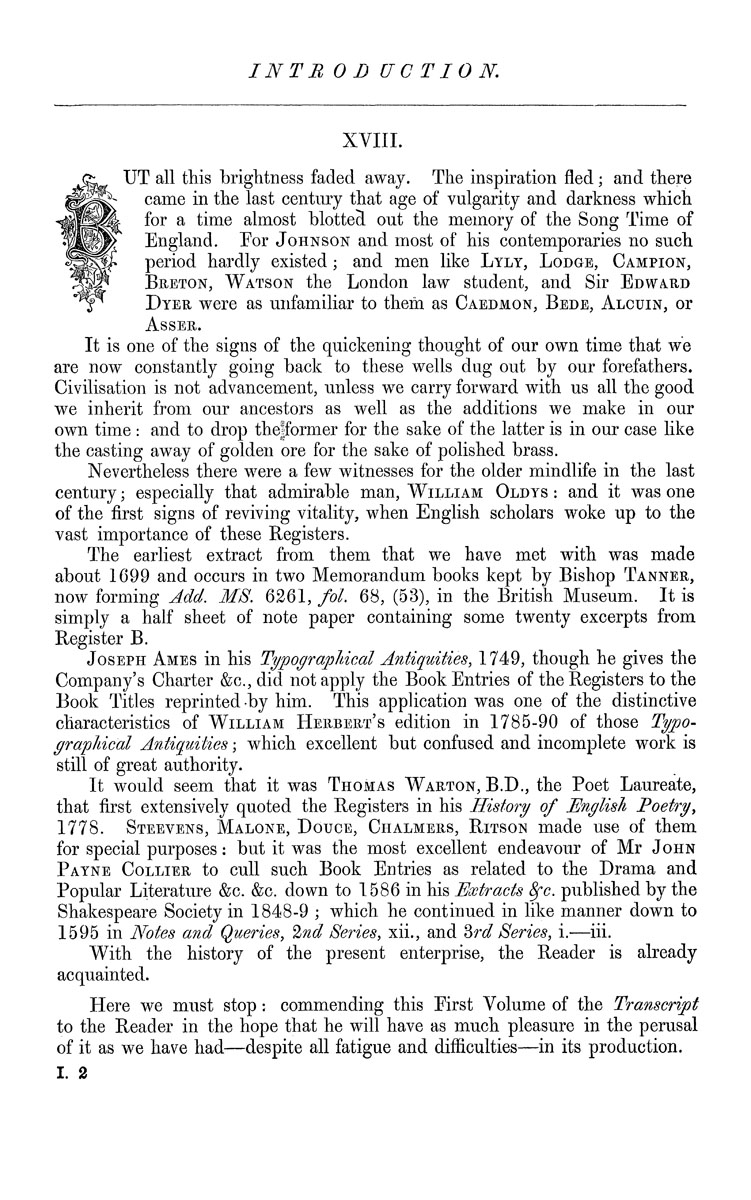INTB 0 D UCTION.
XVIII.
UT all this brightness faded away. The inspiration fled; and there
^^- came in the last century that age of vulgarity and darkness which
for a time almost blotteS out the memory of the Song Time of
England. For Johnson and most of his contemporaries no such
period hardly existed ; and men like Lyly, Lodge, Campion,
Breton, Watson the London law student, and Sir Edward
Dyer were as unfamiliar to them as Caedmon, Bede, Alcuin, or
ASSER.
It is one of the signs of the quickening thought of our own time that we
are now constantly going back to these wells dug out by our forefathers.
Civilisation is not advancement, unless we carry forward with us all the good
we inherit from our ancestors as well as the additions we make in our
own time : and to drop thelformer for the sake of the latter is in our case like
the casting away of golden ore for the sake of polished brass.
Nevertheless there were a few witnesses for the older mindlife in the last
century; especially that admirable man, William Oldys : and it was one
of the flrst signs of reviving vitality, when English scholars woke up to the
vast importance of these Registers.
The earliest extract from them that we have met with was made
about 1699 and occurs in two Memorandum books kept by Bishop Tanner,
now forming Add. MS. 6261, fol. 68, (53), in the British Museum. It is
simply a half sheet of note paper containing some twenty excerpts from
Register B.
Joseph Ames in his Typographical Antiquities, 1749, though he gives the
Company's Charter &c., did not apply the Book Entries of the Registers to the
Book Titles reprinted by him. This application was one of the distinctive
characteristics of William Herbert's edition in 1785-90 of those Typo¬
graphical Antiqidties; which excellent but confused and incomplete work is
still of great authority.
It would seem that it was Thomas Warton, B.D., the Poet Laureate,
that first extensively quoted the Registers in his History of English Poetry,
1778. Steevens, Malone, Douce, Chalmers, Ritson made use of them
for special purposes: but it was the most excellent endeavour of Mr John
Payne Collier to cull such Book Entries as related to the Drama and
Popular Literature &c. &c. down to 1586 in his Extracts 8fc. published by the
Shakespeare Society in 1848-9 ; which he continued in like manner down to
1595 in Notes and Queries, 2nd Series, xii., and ^rd Series, i.—iii.
With the history of the present enterprise, the Reader is already
acquainted.
Here we must stop: commending this First Volume of the Transcript
to the Reader in the hope that he will have as much pleasure in the perusal
of it as we have had-—despite all fatigue and difficulties—in its production.
I. 2
|








